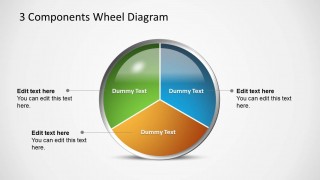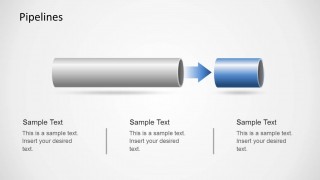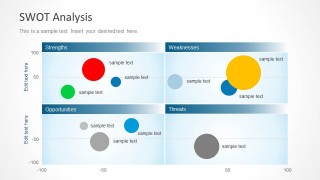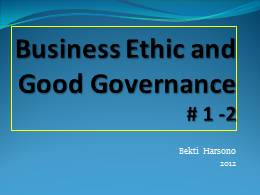Learn more how to embed presentation in WordPress
- Slides
- 44 slides
Published Feb 27, 2013 in
Business & Management
Direct Link :
Copy and paste the code below into your blog post or website
Copy URL
Embed into WordPress (learn more)
Comments
comments powered by DisqusPresentation Slides & Transcript
Presentation Slides & Transcript
Business Ethic and Good Governance
# 1 -2
Bekti Harsono
2012
## 1.
Ethics and Business: Concept and Theory
The meaning of Ethics
Code of Ethics
Introduction: Making the Case for Business Ethics
Business Ethics as Ethical Decision Making
Business Ethics as Personal Integrity and Social Responsibility
Ethics and the Law
Ethics as Practical Reason
Ethics as measurement of Behavior.
Course Objective
Explain why ethics is important in the business environment
Explain the nature of business ethics as an academic discipline
Distinguish the ethics of personal integrity from the ethics of social responsibility
Distinguish ethical norms and values from other business-related norms and values
Distinguish legal responsibilities from ethical responsibilities
Explain why ethical responsibilities go beyond legal compliance
Describe ethical decision making as form of practical reasoning.
Plato, said
Good people do not need laws to tell them to act justly, while bad people will find a way around the law.
The Meaning of Ethics
A discipline dealing with good and evil and with moral duty.
Moral principles or practice.
A set of moral principles or values.
A theory or system of moral values.
Webster’s New World Dictionary.
The Meaning of Ethics
Element refers to the application of values within a business context.
Business Ethics; Decision Making for Personal Integrity & Social Responsibility, by Laura P. Hartman – Joe DesJardins, McGraw-Hill International Edition, 2011,
The Meaning of Ethics
The general rules of conduct in society.
Dictionary of Human Resources and Personnel Management.
The framework of values that employees use to guide their behavior.
Are standards of beliefs and values that guide conduct, behavior, and activities (help us do the right thing).
The Management Bible, Bob Nelson & Peter Economy.
Leader vs Manager
Business Ethics
Is the art of anticipating and negotiating solutions acceptable to all constituents.
What’s Ethical in Business, by Verne E. Henderson, McGraw Hill, Inc.
Business Ethics
Is the art of anticipating and negotiating solutions acceptable to all constituents.
What’s Ethical in Business, by Verne E. Henderson, McGraw Hill, Inc.
Code of Ethics
A code of working which shows how a professional group should work, and in particular what type of relationship they should have with their clients.
Dictionary of Human Resources and Personnel Management.
A good Code of Ethics
Compliance with internal policies and procedures.
Compliance with external laws and regulations.
Direction from organizational values.
Direction from individual values.
Some issues addresses by Code of Ethics
Equal opportunity
Sexual harassment
Diversity
Privacy and confidentiality
Conflict of interest
Gift and gratuities
Employee health and safety
What’s in a Comprehensive Code of Ethics (The Management Bible)
A memorable title
WB: Living Our Values
Pricewaterhouse: The Way We Do Business
Leadership letter (commitment)
Table of contents
Introduction-prologue (why important)
Statement of core values (primary values)
Code provisions (the meat of the code, the organization position on wide variety of issues)
Information and resources.
ETHICS
Evaluate circumstances through the appropriate filters.
Treat People and issues fairly within the established boundaries. Fair doesn’t always mean equal.
Hesitate before making critical decision.
Inform those affected of the standard/decision that has been set/made.
Create an environment of consistency for yourself and your working group.
Seek counsel when there is any doubt (but from those are honest and whom you respect.
Introduction: Making the Case for Business Ethics
Where Business is Feeling the Heat
H
M
L
Why do be good?
The Institute for Business, Technology and Ethics suggest the following “Nine Good Reasons” to run a business ethically:
Litigation/indictment avoidance
Regulatory freedom
Public acceptance
Investor confidence
Supplier/partner trust
Customer loyalty
Employee performance
Personal pride
It is the right thing to do.
Business Ethics as Ethical Decision Making
We assume that decisions that follow from a process of thoughtful and conscientious (careful) reasoning will be more responsible and ethical.
In other words,
Responsible decision making and deliberation (consideration) will result in more responsible behavior.
Business Ethics as Personal Integrity and Social Responsibility
Personal Integrity
At its most basic level, ethics is concerned with how we act and how we live our lives (morality).
Social Ethics (Responsibility)
How should we live? Refers to how we live together in a community.
CSR
Ethics is a Normative ?
Norms
Those standards of appropriate and proper (or normal) behavior.
Norms establish the guidelines/standard for determining:
What we should do ?
How we should act ?
What type of person we should be ?
Norms vs Value
Values
The underlying beliefs that cause us to act or to decide one way rather than another.
Types of Values:
Financial
Religious
Legal
Historical
Nutritional
Political
Scientific, and
Aesthetic.
Ethics and the Law
Any discussion of norms and standards of proper behavior would be incomplete without considering the Law,
Deciding what one should do in business situations often requires reflection on what the law requires, expects, or permits,
But legal norms and ethical norms are not identical, nor do they always agree.
Ethical and Legal Quadrants
LEGAL
ILLEGAL
ETHICAL
UNETHICAL
Transparency International 2008 Bribe Payers Index (BPI)
The Business Sector Corruption Scorecard
Ethics as Practical Reason
Practical Reasoning
About what we should do
Theoretical Reasoning
About what we should believe.
Ethics as Measurement of Behavior
Ethics :
Element refers to the application of values within a business context.
Values implemented by people behavior.
## 2.
Ethical decision Making: Personal and Professional Context
Introduction
A Decision Making Process for Ethics
When Ethical Decision Making Goes Wrong: Why do “Good” People Engage in “Bad” Acts?
Ethical Decision Making in Managerial Role.
Course Objectives
Describe a process for ethically responsible decision making
Apply this model to ethical decision points
Explain the reasons why “good” people might engage in unethical behavior
Explore the impact of managerial roles on the nature of our decision making.
What Would You Do?
Imagine that you are the first person to arrive for your Business Ethics class. As you sit down at your desk, you notice an iPod on the floor underneath the adjacent (near/next) seat. You pick it up and turn it on. It works just fine, and it even has some of your favorite music listed. Looking around, you realize that you are still the only person in the room and that no one will know if you keep it.
Not being able to decide immediately, and seeing that other students are beginning to enter the room, you place the iPod down on the floor next to your own backpack and books. As the class begins, you realize that you have the full class period to decide what to do.
What Would You Do?
What would you think about as you sat there trying to decide what to do?
What would you do?
Now let change the scenario:
Imagine that you are become another person :
The friend of that person (iPod owner)
Judicial Board Member
What would you do?
What Would You Do?
What are the key facts that you should consider before making a decision, as either the person who discovered the iPod, the friend, or the judicial board member?
Is this an ethical issue? What exactly are the ethical aspects involved in your decision?
Who else is involved, or should be involved, in this decision? Who has the stake in the outcome?
What alternatives are available to you? What are the consequences of each alternative?
How would each of your alternatives affect the other people you have identified as having a stake in the outcome?
Where might you look for additional guidance to assist you in resolving this particular dilemma?
Introduction
If you find a lost iPod, you cannot avoid making an ethical decision, whether by act or omission (skip). Whatever you do - or do not do - with the iPod, you will have made a choice that will be evaluated in ethical terms and have ethical implications.
Ethical decision making occurs in everyday life within business contexts.
A Decision-Making Process for Ethics
Determine the facts of the situation
Distinguish between facts and opinion
Ability to recognize a decision or issue as an ethical decision or ethical issue (Identifying the ethical issues involved)
Identify and consider all of the people affected by a decision, the people often called stakeholders.
Consider the available alternatives (moral imagination)
Compare and weigh the alternatives
Stakeholders Map (Multinational)
Domestic
Employees
Customers/
Clients
Franchises/Subsidiaries
Social Norms & Custom
Home Government
Ecosystem
Shareholders
Communities
Suppliers/Vendors
Offshore Workers
Local Governments
Organization/Firms
An Ethical Decision-Making Process
Determine the facts
Identify the ethical issues involved
Identify stakeholders and consider the situation from their point of view
Consider the available alternatives-also called “moral imagination”
Consider how a decision affects stakeholders, comparing and weighting the alternatives, based on:
Consequences
Duties, rights, principles
Implications for personal integrity and character
Make a decision
Monitor and learn from the outcome.
When Ethical Decision Making Goes Wrong: Why Do “Good” People Engage in “Bad” Acts?
Ignorance
Consider (only) limited alternatives
Simplified decision rules
Minimum decision criteria
Lack the courage to do otherwise
Peer pressure
Actual thinking is influenced by peers
Ethical Decision Making in Managerial Roles
Individual decision making can be greatly influenced by social context in which it occurs.
Personal Integrity lies at the heart of such individual decision making:
What kind of person am I?
What are my values?
What do I stand for?
In business context, individual fill roles of
Employees,
Managers,
Senior executives,
Board members.
Expectation,
Responsibilities,
Duties.
Within a business setting,
Individuals must consider the implications of both,
Personal and
Professional decision making.
Institutional role:
Manager, teacher, student-body president.
Social role:
Friend, Son or daughter, Spouse, Citizen, Neighbor.
Specific professions role:
Attorneys, accountants, auditors, financial analyst, and others.
The Ethical Algorithm (process)
The Ethical Algorithm is such a tool. Its use requires thoughtful examination of the four critical dimensions of corporate action:
GOALS
METHODS
MOTIVES, and
CONSEQUENCES.
The Ethical Algorithm, Five Basic Assumption
Business ethics is a process
Human behavior is caused
Action have consequences
What’s perceived as ethical depends on the viewpoint of the constituent
The need for good ethics rest on our mutual vulnerability.
Algorithm
Goals : What do you want to achieve?
Methods : How will you pursue your goals?
Motives : What personal needs drive you to achieve.
Consequences : What results can you anticipate.
Algorithm
Goals : Get rich
Methods : Rob banks
Motives : Antisocial drive for financial security.
Consequences : Make millions, buy a condo complex in Florida, and retire early.






